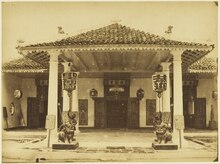Contents
Moluccan Chinese are a community of Chinese Indonesians who lives in the Maluku Islands.[1][2]
History
Maluku has been recorded in the tambo of the Tang dynasty in China (618-906) which mentions 'Miliku', namely an area used as a benchmark for determining the direction to the kingdom of Holing (Kalingga) in the west. WP Groenveldt estimates this 'Mi-li-ku' to be Maluku.
The history of the entry of ethnic Chinese into Indonesia in general cannot be ascertained well as with their arrival in the Maluku Islands, even if there are sources that prove the arrival of ethnic Chinese, mostly from stories from the local community and also from some evidence of inheritance from Chinese descendants who are still there and have even intermarried with native Maluku people.[3][4][5]

Family Name
Common surname among Chinese Maluku :
- Cia/Tjia (Chinese: 謝, pinyin: xie)
- Gouw/Goh (Chinese: 吳, hanyu pinyin: wu)
- Kang/Kong (Chinese: 江, pinyin: jiang)
- Lauw/Lau (Chinese: 劉, pinyin: liu)
- Lee/Lie (Chinese: 李, pinyin: li)
- Oey/Ng/Oei (Chinese: 黃, hanyu pinyin: huang)
- Ong (Chinese: 王, pinyin Chinese: wang)
- Tan (Chinese: 陳, pinyin Chinese: chen)
- Tio/Thio/Theo/Teo (Chinese: 張, pinyin:zhang)
- Lim (Chinese: 林, pinyin: lin)
One of the common phenomena in Indonesia is because the surname is pronounced in the Hokkien dialect, so there is no one exact standard of writing (romanization). This also causes many clans to have the same pronunciation in the Hokkien dialect, sometimes the same surname is actually not the case.
- Tio besides referring to the surname Zhang (張) in Mandarin, is also a Hokkien dialect of the clan Zhao (趙)
- Besides referring to the Hong (洪) surname in Mandarin, Ang is also a Hokkien dialect of the Weng (翁) clan
The Chinese name is asimilate as common Maluku Surnames
- Tan and Oei referring to the Afaratu, surname in Saumlaki,Maluku [6]
- Tan referring to the Tanlain, surname in Maluku
- Gan referring to the Ganwarin, surname in Maluku
- Go referring to the Gosal, surname in Maluku
- Go referring to the Gosan, surname in Maluku
- Oa referring to the Hamenda, surname in Maluku
- Lie referring to the Lerebulan, surname in Maluku
References
- ^ "Orang Tionghoa:Suatu pengantar tentang jejak keberadaan dan warisan budaya di Maluku". siwalimanews. Retrieved 2 May 2023.
- ^ "Warga Tionghoa Bagian Dari Persaudaraan Maluku". kompas.com. Retrieved 2 May 2023.
- ^ "Kelenteng Thian Hou Kiong dan Sejarah Eksistensi Etnis Tionghoa di Ternate". RRI. Retrieved 2 May 2023.
- ^ "Junks to Mare Clausum: China-Maluku Connections in the Spice Wars, 1607–1622" (PDF). Cambridge. Retrieved 20 July 2023.
- ^ "Jejak Peninggalan Tionghoa di Maluku". bolong.id. Retrieved 23 July 2023.
- ^ "Warga GPM Tionghoa di Saumlaki Gelar Syukuran di Pantai Kelyar Jaya". lelemuku.id. Retrieved 2 May 2023.

